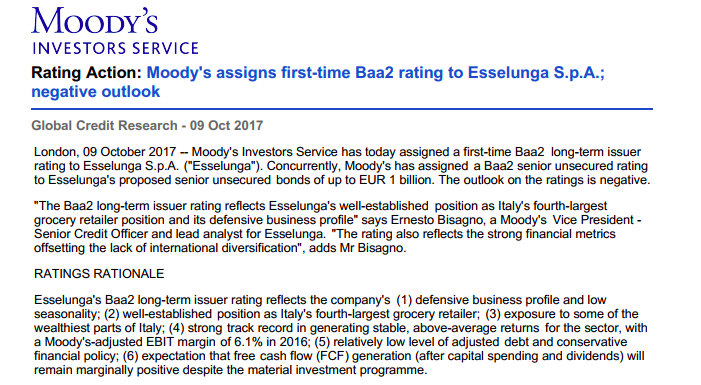 Moody’s assigned a Baa2 long-term corporate rating to Esselunga spa and its coming senior unsecured bond.On the same side was also Standard&Poor’s who assigned a preliminary BBB- rating to the group with a stable outlook.
Moody’s assigned a Baa2 long-term corporate rating to Esselunga spa and its coming senior unsecured bond.On the same side was also Standard&Poor’s who assigned a preliminary BBB- rating to the group with a stable outlook.
The Italian supermarket chain is actually issuing its first bond for as much a one billion euros in order to partly refinance a 1.5 billion euros loan it obtained last July by a pool of banks (Citi, Mediobanca, Unicredit, Intesa Sanpaolo and then Banco Bpm and Bnp Paribas). The loan was necessary to finance a shareholders re-organization of the group controlled by the Caprotti family in view of the listing of Esselunga at the Italian Stock Exchange in 18-24 months.
Esselunga reached 7.54 billion euros in revenues in 2016 with 661 millions in ebitda. Moody’s said that the rating reflects the company’s (1) defensive business profile and low seasonality; (2) well-established position as Italy’s fourth-largest grocery retailer; (3) exposure to some of the wealthiest parts of Italy; (4) strong track record in generating stable, above-average returns for the sector, with a Moody’s-adjusted ebit margin of 6.1% in 2016; (5) relatively low level of adjusted debt and conservative financial policy; (6) expectation that free cash flow (FCF) generation (after capital spending and dividends) will remain marginally positive despite the material investment programme. The rating also reflects the company’s (1) lack of international diversification and hence reliance on the economic conditions in Italy, although Moody’s notes the company’s resilient performance during the financial crisis; (2) relatively smaller size and higher geographical concentration than other rated European retailers.
Moody’s also says that leverage (Moody’s adjusted gross debt to ebitda) at December 2017 to be 2.3x. The calculation includes around 1.3 billion euros of debt of which almost 900 millions funding the acquisition of the 67.5% stake in Villata Partecipazioni spa and 417 million euros of adjustments for operating leases and pensions. In addition, the rating agency notes the existence of 300 millions of debt at the level of the holding company Supermarkets Italiani spa and the significant minority stake of 32.5% in Villata Partecipazioni. While the 300 million euros debt is not factored in Moody’s credit metrics, the holding company Supermarkets largely relies on dividend payments from Esselunga to service the debt.
Finally, Moody’s expects FCF generation to be broadly neutral in 2018, owing to discretionary capex plan and working capital needs due to changing value-added tax payables, and to improve in 2019-20 at 50 -100 million euros each year. As a result, Moody’s expects leverage to decline marginally towards 2.2x by 2019, with the decline driven by a combination of higher ebitda and stable gross debt. On a reported net debt to ebitda calculation, that would be equal to 1.3x in 2019, down to 1.1x in 2020, within the company’s targets to maintain reported net leverage below 1.5x.


